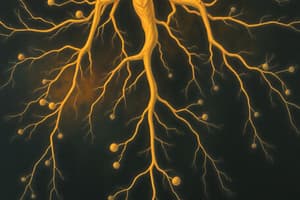Podcast
Questions and Answers
What is the primary role of lymph nodes in the lymphatic system?
What is the primary role of lymph nodes in the lymphatic system?
- To produce red blood cells
- To absorb fats and fat-soluble vitamins
- To transport oxygen in the blood
- To filter lymph and remove pathogens (correct)
How do lymphatic vessels prevent backflow of lymph?
How do lymphatic vessels prevent backflow of lymph?
- By using valves (correct)
- By maintaining high pressure
- Through muscle contractions
- By being designed as blind-ended tubes
Which of the following structures is primarily involved in the development of T lymphocytes?
Which of the following structures is primarily involved in the development of T lymphocytes?
- Lymph nodes
- Thymus (correct)
- Spleen
- Tonsils
What role do lymphatic capillaries play in the lymphatic system?
What role do lymphatic capillaries play in the lymphatic system?
Which component of the lymphatic system is primarily responsible for filtering blood?
Which component of the lymphatic system is primarily responsible for filtering blood?
What type of fluid is lymph primarily composed of?
What type of fluid is lymph primarily composed of?
Which function is NOT associated with the lymphatic system?
Which function is NOT associated with the lymphatic system?
Where are lymphatic nodules primarily located?
Where are lymphatic nodules primarily located?
What role do lymph nodes play in the lymphatic system?
What role do lymph nodes play in the lymphatic system?
Which of the following is a common sign of lymphatic obstruction?
Which of the following is a common sign of lymphatic obstruction?
What is the significance of monitoring lymph node enlargement in nursing practice?
What is the significance of monitoring lymph node enlargement in nursing practice?
Which nursing intervention is appropriate for patients with lymphedema?
Which nursing intervention is appropriate for patients with lymphedema?
In the context of the lymphatic system, what is lymphadenopathy?
In the context of the lymphatic system, what is lymphadenopathy?
What should be regularly assessed to monitor lymphatic dysfunction in patients?
What should be regularly assessed to monitor lymphatic dysfunction in patients?
Which of the following reflects a nursing assessment for lymphatic conditions?
Which of the following reflects a nursing assessment for lymphatic conditions?
What should patients be educated about to maintain a healthy lymphatic system?
What should patients be educated about to maintain a healthy lymphatic system?
Flashcards
Lymph node function
Lymph node function
Lymph nodes filter lymph, removing cellular debris and pathogens.
Lymphedema
Lymphedema
Swelling in tissues due to fluid buildup, often caused by lymphatic system dysfunction.
Lymphadenopathy
Lymphadenopathy
Enlarged lymph nodes, which can indicate infection, inflammation, or other health issues.
Immune system and lymphatic system
Immune system and lymphatic system
Signup and view all the flashcards
Lymphatic vessels
Lymphatic vessels
Signup and view all the flashcards
Lymphatic drainage techniques
Lymphatic drainage techniques
Signup and view all the flashcards
Compression therapy
Compression therapy
Signup and view all the flashcards
Lymphatic surgical procedures
Lymphatic surgical procedures
Signup and view all the flashcards
Lymphatic System
Lymphatic System
Signup and view all the flashcards
Lymphatic Capillaries
Lymphatic Capillaries
Signup and view all the flashcards
Lymph Nodes
Lymph Nodes
Signup and view all the flashcards
Lymph
Lymph
Signup and view all the flashcards
Spleen
Spleen
Signup and view all the flashcards
Tonsils & Adenoids
Tonsils & Adenoids
Signup and view all the flashcards
Thymus
Thymus
Signup and view all the flashcards
Fluid Balance (Lymphatic System)
Fluid Balance (Lymphatic System)
Signup and view all the flashcards
Study Notes
Overview of the Lymphatic System
- The lymphatic system is a network of vessels, tissues, and organs vital for maintaining fluid balance, immune defenses, and fat absorption.
- It is a crucial part of the immune system, working in concert with the cardiovascular system to maintain homeostasis.
- Lymph, a clear fluid containing white blood cells, flows unidirectionally toward the heart.
Lymphatic Vessels
- Lymphatic capillaries are microscopic, blind-ended vessels dispersed throughout most tissues.
- These capillaries are highly permeable, allowing fluids and large molecules (like proteins) to enter.
- Lymph capillaries merge into larger lymphatic vessels, equipped with valves to prevent backflow.
- Lymphatic vessels ultimately drain into larger ducts that empty into the circulatory system.
- Lymphatic vessels and ducts mirror the structure of veins, including valves.
Lymph Nodes
- Lymph nodes are small, bean-shaped organs positioned along lymphatic vessels.
- Lymph nodes act as filters, removing pathogens and cellular debris from lymph.
- Lymph nodes house lymphocytes, a type of white blood cell, crucial in immune responses.
- Lymph nodes are strategically placed to intercept pathogens entering the body.
Lymphatic Organs and Tissues
- The spleen, a large lymphatic organ situated in the upper left quadrant of the abdomen, removes old red blood cells, filters blood, and participates in immune responses.
- Tonsils and adenoids, masses of lymphatic tissue located in the throat, play a role in initial immune responses against inhaled and ingested pathogens.
- The thymus, an organ in the chest, is essential in the development of T lymphocytes (a type of white blood cell).
- Lymph nodules, smaller collections of lymphatic tissue, are scattered throughout the body and involved in immune responses.
Functions of the Lymphatic System
- Fluid balance: Lymphatic vessels collect excess interstitial fluid, returning it to the circulatory system and preventing edema.
- Fat absorption: Lymphatic vessels absorb fats and fat-soluble vitamins from the digestive system, then transport them to the circulatory system.
- Immunity: The lymphatic system plays a critical role in defending against pathogens (bacteria, viruses, and fungi). Immune cells reside within lymphatic tissues and organs, responding to foreign substances.
- Defense mechanisms include filtering lymph, producing antibodies, and activating immune cells.
- Removal of waste products and cellular debris: Lymph nodes filter lymph, eliminating cellular debris and pathogens.
Significance in Nursing Practice
- Monitoring lymph node enlargement (lymphadenopathy), which may indicate infection or other issues.
- Assessing for signs of lymphatic obstruction, leading to edema.
- Understanding the lymphatic system's role in immune responses and the impact of immunodeficiencies on patient care and treatment strategies.
- Infection and injury to lymphatic vessels can have widespread effects on the body.
- Thorough knowledge of lymphatic system function is essential for comprehending patient conditions and administering appropriate interventions.
- Recognizing the impact of surgical procedures targeting lymphatic system structures on the body and the resulting care plans.
Common Nursing Assessments
- Observe for edema, particularly in extremities; swelling and pitting edema can indicate lymphatic obstruction or dysfunction.
- Palpate lymph nodes for enlargement and tenderness to help diagnose potential infections or other conditions.
- Note any past lymphatic disorders, such as lymphedema or lymphomas.
- Regular assessment of the patient's overall health is crucial. Infection, injury, or trauma should be considered factors in lymphatic dysfunction.
- Monitor closely patients undergoing procedures or surgeries that may affect lymphatic drainage.
Nursing Interventions
- Provide supportive care for patients with lymphatic conditions (e.g., lymphedema), focusing on improving lymphatic drainage through massage.
- Educate patients about proper hygiene and self-care practices to maintain a healthy lymphatic system.
- Implement preventative measures like compression garments or appropriate exercise for lymphatic drainage support.
- Provide comfort, support, and address any anxieties related to lymphatic conditions.
Studying That Suits You
Use AI to generate personalized quizzes and flashcards to suit your learning preferences.




